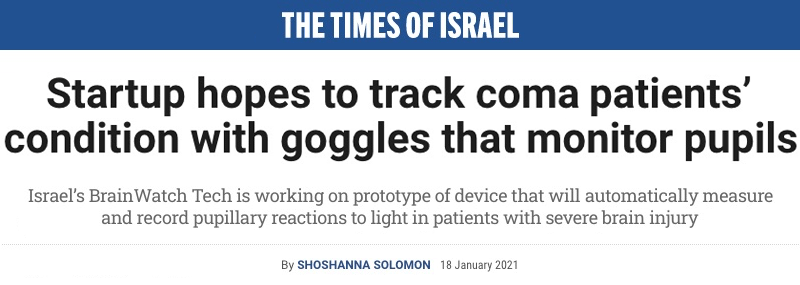
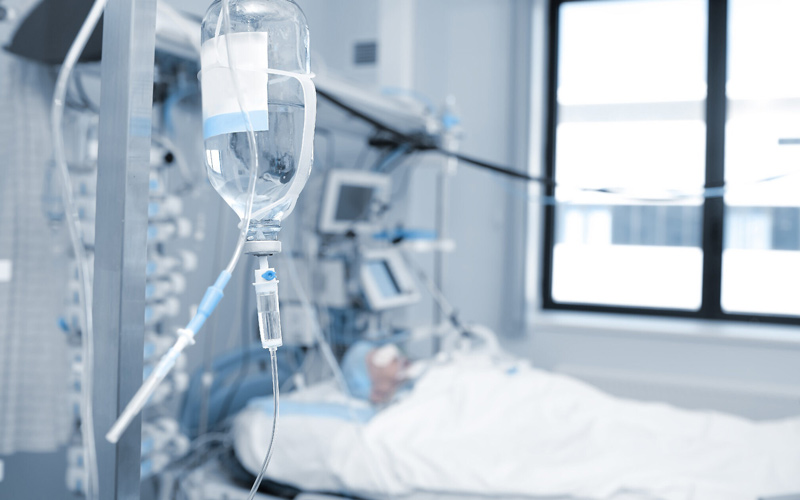
Israeli startup BrainWatch Tech is developing an eye-pupil monitoring technology that will notify healthcare professionals of changes in the pupillary reactions of patients with severe brain injury, alerting them to a possible need for immediate intervention.
Every year, there are over a million people diagnosed with severe brain injury across the United States and the European Union stemming from traumatic accidents such as car crashes or falls, or from strokes.
While these patients are in intensive care, the nursing staff needs to manually examine their pupils by lifting the eyelids, illuminating the eyes with a flashlight and measuring the pupil’s response with a ruler, and charting the results of the test.
A tightening of the pupils in reaction to light indicates that the brain stem, the most basic part of the brain, is still active. If there is no reaction, it means the patient’s condition is deteriorating, calling for medication or surgery to halt possible neural deterioration and further brain damage.
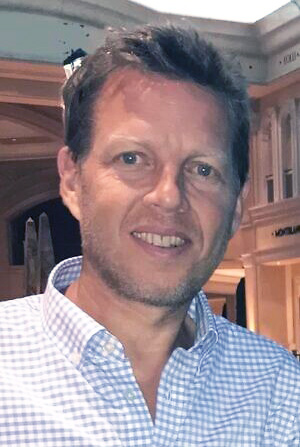
Pupil assessment is a fundamental and crucial part of the neurological examination in brain injury cases. In severe traumatic brain injury patients, abnormalities in pupillary responses are often an indication of neurological deterioration and are correlated with poor neurological outcomes.
Therefore, in the clinical evaluation of comatose patients, the pupillary examination is an important tool as it is a direct indication of the brain stem condition, and changes in it represent an immediate sign of neurological deterioration. In such cases, urgent clinical intervention is required.
Despite its clinical importance, the standard of care for pupil examination in unconscious patients has undergone no significant changes in the last 100 years, said Ilan Carmel, the CEO of the startup.
Manual pupillary assessment is a labor-intensive, time-consuming task. Under the best conditions, in the neuro intensive care unit, it is performed once every hour. As a result, it is not continuously monitored and changes in pupil size are seldom detected as they occur, he added, even though immediate medical intervention is critical to patient survival and neurological outcome.
“We are developing an automatic and continuous system for pupillary light reflex monitoring,” he said, which will work without physical contact.
The product, a prototype of which is now being built, will look like a pair of virtual reality goggles, equipped with a camera lens and a light, that will continuously monitor, measure and record pupil size and reflex through the closed eyelids of patients with severe brain injury, Carmel said.
The electronic system will immediately alert staff to any abnormal findings in the patient wearing the goggles. The continuous monitoring will create a record of the patient’s condition and response to treatment over time.
The system will also enable pupil monitoring in real time during complex brain surgery, a possibility that does not currently exist, the company said in a statement.
Carmel said he hopes the prototype will be ready in a year, and the company will then be able perform clinical studies in hospitals to evaluate the system.
The technology was born in the BioDesign program of the Hebrew University of Jerusalem in collaboration with Hadassah Medical Center, in which bioengineering and business graduate students from the Hebrew University are connected with clinicians from the Hadassah Medical Center to raise awareness about medical needs and to help bring medical innovations to the market.
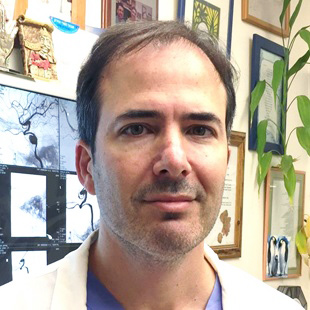
At one of the sessions, Prof. Jose Cohen, director of the Endovascular Neurosurgery Unit, mentioned how difficult it was to continuously monitor comatose patients, and the idea grew from there. Cohen eventually teamed up with Dr. Yosef Farage from the Hebrew University, who also became a founder of the firm. Along with Dr. Amnon Boksboim and Dr. Zvi Batos from the Hebrew University’s Center for Bioengineering, they developed an initial lab model and demonstrated the feasibility of the technology in a clinical trial on 40 volunteers at Hadassah Medical Center.
The experiment demonstrated the ability of technology to measure the size of a pupil and its response to light through the eyelids, as well as the system’s safety, the company said.
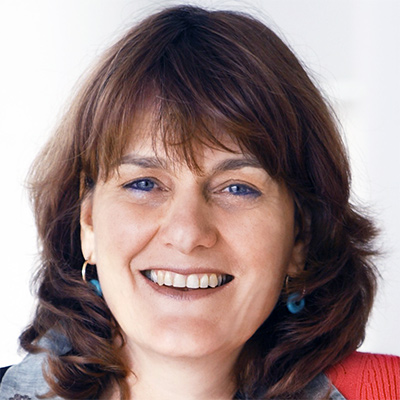
According to Dr. Tamar Raz, CEO of Hadasit, the tech commercialization arm of Hadassah Medical Center, the technology, once developed, could reduce the high costs of treating patients with brain injury, which is estimated at over $100 billion a year in the United States alone.
Raz added that the project is an indication of how important it is to have programs like BioDesign, set up eight years ago, in which medical needs are discussed. “If the program didn’t exist, then maybe this need would never have been raised.”
BrainWatch Tech was established in the eHealth Ventures incubator that fosters early-stage digital health startups. The incubator is a partnership of US biotech firm Amgen, Israel’s Maccabi Health Services, Medison Ventures, the VC arm of pharmaceutical service provider Medison, and the Chinese investment fund SCI.